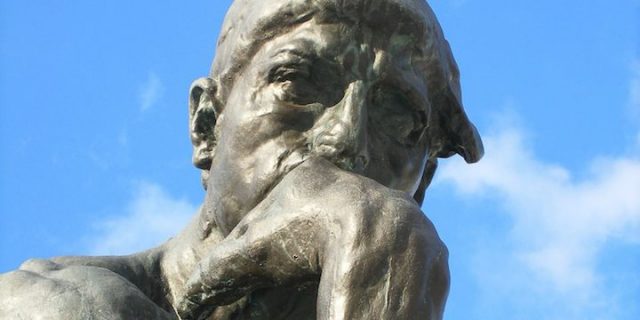This page in brief
A young university student seems to have it all worked out, with a bright future in front of her, but everything changed in a moment, and her worldview was turned completely upside down.
This is the story of how she recovered from a great loss, and how she found a philosophy that could deal with the harsh realities of life.
What is truth?
Alison’s story begins when she was 16 at school in the UK. Obviously an extremely intelligent girl, her greatest concern was “trying to map a path through the tangled growth of the adult world looming up before me.”
And so she set out to answer the question: What is truth? “It seemed to me that if I could find the answer to this question, I would be standing on some kind of basic platform from which it would be possible to try and build the building that would be my life.” So she went to the philosophy section of her school library and “learned the difference between contingent truth and absolute truth, despaired of ever reaching out into the latter, if indeed there was such a thing as absolute truth, and settled for the prospect of constructing my platform on a foundation of contingent truth.”
Contingent truth, she learned “doesn’t bother itself with the absolutes of the universe; contingent truth is man-made truth …” concerned about things we can touch and measure, such as “when I sit on my chair it will hold my weight”.
She thought believing in any truth was an act of faith, and because she had a vague idea that faith was somehow related to christianity, she bought a Bible and tried to read it, but it didn’t make any sense.
Life is meaningless?
So she went back to philosophy, and discovered Jean-Paul Sartre and existentialism, and found that he made sense: “in the absence of the existence of any absolute truth the only way to make sense of life was to create one’s own meaning.” And so she started to build the life she wanted – attending Cambridge University to study modern languages and enjoy university life.
“Released from the confines of home and school, I flung myself into new activities. I cycled through the mist of frosty mornings to row on the River Cam. I took the little orange tent of my childhood into the fens, and spent summer weekends among the hum of mosquitoes and the grating of sedge warblers. I discovered 2,000 years of literature …. I spent a year in Florence, studying in shuttered libraries with curved wooden seats, watching shafts of sunlight slant through the darkened air, specks of dust dancing in their beam….” After competing her degree with First Class Honours, she embarked on further study, of the “Divine Comedy” by Medieval Italian writer Dante Alighieri.
And then her friend Ruth died.
Ruth’s challenge
Ruth had been her director of studies as an undergraduate. Married with school age children, Ruth was intelligent, vivacious, encouraging, challenging, and she had had a deep and positive impact on Alison. And then Ruth’s cancer returned, and Alison had to watch her die.
“…. the universe that I had so carefully arranged around me fell apart. As the cancer consumed her body and dimmed her spirit, an earthquake rumbled beneath my platform of contingent truth, and the bricks of my self-constructed meaning began to totter and slide.”
Ruth didn’t want to die, but “she knew where she was going”, because she was a christian. They talked about it. For Ruth, the strength of christianity was that “it had been found to make sense in many different cultures.”
And then Ruth asked Alison a simple question that simply blew her world apart: Could she imagine her existentialism making sense in the Middle Ages? “Of course I couldn’t. I left the house that day drained and empty. You cannot construct your own reality. There are absolute truths, and one of them is death. Build what you like, but you’re building it in a bubble. And sooner or later the bubble will meet a pin.”
After Ruth died, Alison traveled again to Florence, with a lot to think about. “I knew it was back to the drawing board.” She had seen Ruth die in peace, “and I knew that her building had stood on a platform that had not subsided when faced with the intrusion of death ….”
A new direction
Alison decided that she needed to try to read the Bible again. “I resolved that wherever truth was to be found, it had to be capable of providing a framework of meaning …. outside the language and assumptions of a particular culture. I’d had enough of contingent truth. This time it had to be the absolute version. And so my journey began again. I read John’s gospel.”
Back at Cambridge, Alison discussed it all with Ruth’s husband. She looked at christianity as a philosophy; she considered Jesus and history; and she thought about Ruth, who had lived and died by her belief in Jesus. “And I arrived, some months later, at the conviction that I had at last found absolute truth. Absolute truth was God, and …. his Son Jesus. It made sense of life both personally and universally. It offered a framework of meaning that could not be shattered by anything I could think of that life might throw at it; and it extended beyond my material and psychological world into … a world of spiritual reality.”
Alison subsequently gained her PhD (in medieval Christian literature), married, was ordained as a minister, led the prayer and counselling work in her church in Leicester and wrote many books. Her story can be found in her book, The Wild Gospel, and you can catch up with her on her web page.
Photo: MorgueFile.
Feedback on this page
Comment on this topic or leave a note on the Guest book to let me know you’ve visited.




